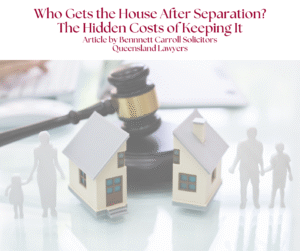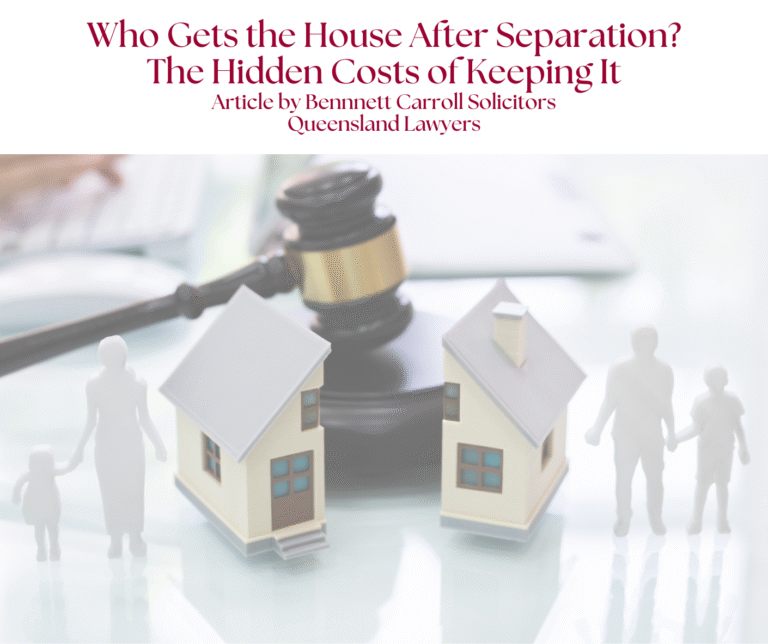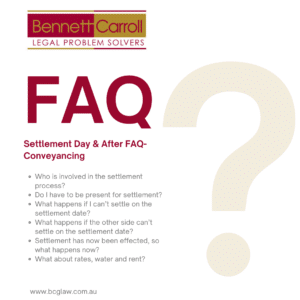When a relationship breaks down, the question of who keeps the family home can quickly become a source of stress, conflict, and financial strain.
For separating couples in Queensland including areas like Brisbane, Stafford, Upper Mount Gravatt, Kawana, Mermaid Beach, Ipswich, and beyond this issue isn’t as simple as deciding who wants it more. Property settlements under family law involve a complex assessment of each party’s respective contributions and future needs. And while one partner might feel emotionally tied to the house, the financial reality of keeping it is often underestimated.
The Hidden Costs of Keeping the Family Home
- Affordability Stress:
Can you realistically afford mortgage repayments, rates, and maintenance costs on a single income in the current market?
- Equity & Future Security:
Keeping the home might leave you asset-rich but cash-poor, impacting your ability to meet other financial needs or plan for the future.
Many clients come to us feeling desperate to hold onto the family home, but when we unpack the full financial picture, the risks often outweigh the benefits.
For a deeper look into the complexities of handling joint debt and ongoing financial obligations, read our article on Understanding Mortgage Responsibilities After Separation. ⬅️ Click here.
How Queensland Law Decides Who Gets the House
Deciding who gets the house isn’t a simple negotiation; it is governed by the Family Law Act 1975 (Cth). The Courts follow a strict four-step process to determine a just and equitable property settlement for separating couples.
The 4-Step Property Settlement Process
1. Identify and Value the Net Asset Pool:
This step establishes the total worth of all assets and debts, including the family home, mortgages, superannuation, and other valuables. Accurate valuation of the house is critical here.
For a complete overview of the four-step process, including how all assets are valued, see our core article: How Do We Decide What We Own and What It’s Worth During a Divorce in Queensland?
2. Assess Contributions:
The Court examines both financial (e.g., income, paying the mortgage) and non-financial (e.g., homemaking, parenting) contributions made by each party throughout the relationship.
3. Adjust for Future Needs:
This step involves making adjustments based on factors that may impact a party’s future financial security. This is often where the house decision is scrutinised, as the Court considers things like:
-
- Caring for children (the primary caregiver may have a greater need to retain the home).
- Disparity in income or earning capacity.
- Age and health of each party.
4. Is the Result Just and Equitable?
Finally, the Court reviews the overall proposed settlement to ensure it is fair to both parties.
For many clients, the decision to keep the house is deeply intertwined with the future needs factor. If one party is the primary carer for children, retaining the home may seem essential, but this must be balanced against the hidden costs of keeping the asset.
The Alternative: Selling and Achieving a Clean Break
While fighting to keep the house is understandable, selling the property is often the most financially sensible option, offering a clean break that protects your future security.
Benefits of Selling the Family Home:
- Immediate Cash Injection:
Selling converts an illiquid asset (the house) into a cash sum, which can be easily divided and used by both parties to secure deposits for new housing, invest, or clear debt.
- Reduced Debt Stress:
It allows you to discharge the existing mortgage completely, eliminating the affordability stress of single-income repayments.
- Flexibility:
It gives both parties the financial freedom to re-establish themselves in new homes that truly suit their single-person budgets and future plans.
Don’t Risk Your Financial Future
Every family law matter is unique, and the decisions you make today will impact you for years to come. That’s why you need tailored legal advice to protect your interests and fully understand the implications of the four-step property settlement process.
If you are at the very beginning of the process and need guidance on immediate steps, start here: Separation in Queensland: What Legal Steps Should You Take?
For comprehensive support during your property settlement, let Bennett Carroll Solicitors be your legal problem solvers. We’ll guide you through the complexities and help you make the right decisions for your future.
Ready for Tailored Advice?
Contact us today for a confidential consultation.
We offer face-to-face meetings at our offices in Stafford, Upper Mount Gravatt, Mermaid Beach, Kawana Waters, and Ipswich, or convenient consultations across Queensland via phone or video.
Explore Our Services: Family Law
Every family law matter is unique, and the decisions you make today can impact you for years. That’s why you need tailored legal advice to protect your interests and fully understand the implications of the four-step property settlement process.
If you’re facing a property settlement, let Bennett Carroll Solicitors be your legal problem solvers. We’ll guide you through the process and help you make the right decisions for your future.








